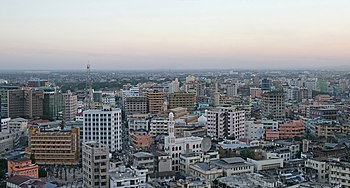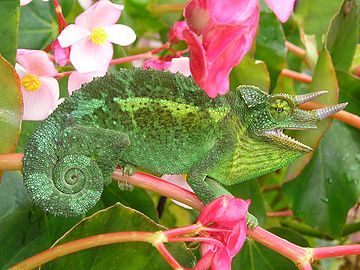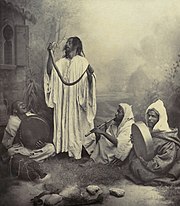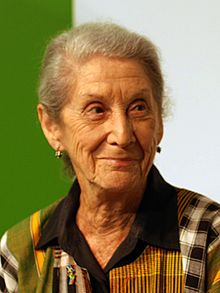Portal:Africa



Africa is the world's second-largest and second-most populous continent after Asia. At about 30.3 million km2 (11.7 million square miles) including adjacent islands, it covers 20% of Earth's land area and 6% of its total surface area. With nearly 1.4 billion people as of 2021, it accounts for about 18% of the world's human population. Africa's population is the youngest among all the continents; the median age in 2012 was 19.7, when the worldwide median age was 30.4. Based on 2024 projections, Africa's population will reach 3.8 billion people by 2099. Africa is the least wealthy inhabited continent per capita and second-least wealthy by total wealth, ahead of Oceania. Scholars have attributed this to different factors including geography, climate, corruption, colonialism, the Cold War, and neocolonialism. Despite this low concentration of wealth, recent economic expansion and a large and young population make Africa an important economic market in the broader global context. Africa has a large quantity of natural resources and food resources, including diamonds, sugar, salt, gold, iron, cobalt, uranium, copper, bauxite, silver, petroleum, natural gas, cocoa beans, and.
Africa straddles the equator and the prime meridian. It is the only continent to stretch from the northern temperate to the southern temperate zones. The majority of the continent and its countries are in the Northern Hemisphere, with a substantial portion and a number of countries in the Southern Hemisphere. Most of the continent lies in the tropics, except for a large part of Western Sahara, Algeria, Libya and Egypt, the northern tip of Mauritania, and the entire territories of Morocco and Tunisia, which in turn are located above the tropic of Cancer, in the northern temperate zone. In the other extreme of the continent, southern Namibia, southern Botswana, great parts of South Africa, the entire territories of Lesotho and Eswatini and the southern tips of Mozambique and Madagascar are located below the tropic of Capricorn, in the southern temperate zone.
Africa is highly biodiverse; it is the continent with the largest number of megafauna species, as it was least affected by the extinction of the Pleistocene megafauna. However, Africa is also heavily affected by a wide range of environmental issues, including desertification, deforestation, water scarcity, and pollution. These entrenched environmental concerns are expected to worsen as climate change impacts Africa. The UN Intergovernmental Panel on Climate Change has identified Africa as the continent most vulnerable to climate change.
The history of Africa is long, complex, and varied, and has often been under-appreciated by the global historical community. In African societies the oral word is revered, and they have generally recorded their history via oral tradition, which has led anthropologists to term them oral civilisations, contrasted with literate civilisations which pride the written word. During the colonial period, oral sources were deprecated by European historians, which gave them the impression Africa had no recorded history. African historiography became organized at the academic level in the mid-20th century, and saw a movement towards utilising oral sources in a multidisciplinary approach, culminating in the General History of Africa, edited by specialists from across the continent. (Full article...)
Selected article –
The Amphitheatre of El Jem (Arabic: قصر الجم, romanized: Qaṣr al-Jamm) is an oval amphitheatre in the modern-day city of El Djem, Tunisia, formerly Thysdrus in the Roman province of Africa. It is listed by UNESCO since 1979 as a World Heritage Site. (Full article...)
Featured pictures –
Did you know (auto-generated) -

- ... that South African physician Tlaleng Mofokeng is the United Nations special rapporteur on the right to health, and was named one of the BBC's 100 Women?
- ... that goalkeeper Sophie Whitehouse, who has lived in England, Africa and the US, has been chosen to play soccer for the Republic of Ireland?
- ... that on February 3, 1986, African Independence Party leaders Adama Touré and Adama Touré were released from detention?
- ... that Patrick Pillay negotiated Seychelles' re-entry into the Southern African Development Community with a reduced membership fee?
- ... that South African mayor Marlene van Staden was re-elected through a coin toss?
- ... that Anderson Stadium in Austin, Texas, is the last high-school football stadium in the state built exclusively for African-American students?
Categories
Selected biography –
Nadine Gordimer (20 November 1923 – 13 July 2014) was a South African writer and political activist. She received the Nobel Prize in Literature in 1991, recognised as a writer "who through her magnificent epic writing has ... been of very great benefit to humanity".
Gordimer was one of the most honored female writers of her generation. She received the Booker Prize for The Conservationist, and the Central News Agency Literary Award for The Conservationist, Burger's Daughter and July's People. (Full article...)
Selected country –
 |
 |
|

| ||
Madagascar, officially the Republic of Madagascar (older name Malagasy Republic), is an island nation in the Indian Ocean, off the southeastern coast of Africa. The main island, also called Madagascar, is the fourth largest island in the world, and is home to five percent of the world's plant and animal species, more than 80 percent of which are endemic to Madagascar. Agriculture, including fishing and forestry, is a mainstay of the economy. Major exports are coffee, vanilla, sugarcane, cloves, cocoa, rice, cassava (tapioca), beans, bananas, peanuts and livestock products.
The principal institutions of the Republic of Madagascar are a presidency, a parliament (National Assembly and Senate), a prime ministry and cabinet, and an independent judiciary. The president is elected by direct universal suffrage for a 5-year term, renewable twice. The National Assembly consists of 160 representatives elected by direct vote every 5 years. The Senate consists of 90 senators, two-thirds elected by local legislators and other Grand Electors and one-third appointed by the president, all for 6-year terms. (Read more...)
Selected city –
Dar es Salaam (/ˌdɑːr ɛs səˈlɑːm/; from Arabic: دَار السَّلَام, romanized: Dār as-Salām, lit. 'Abode of Peace') is the largest city and financial hub of Tanzania. It is also the capital of the Dar es Salaam Region. With a population of over nine million people, Dar es Salaam is the largest city in East Africa by population and the sixth-largest in Africa. Located on the Swahili coast, Dar es Salaam is an important economic center and one of the fastest-growing cities in the world.
The city was founded in the mid-19th century. It was the main administrative and commercial center of German East Africa, Tanganyika, and Tanzania. The decision was made in 1974 to move the capital to Dodoma which was officially completed in 1996. (Full article...)
In the news
- 7 February 2025 – Kivu conflict
- The United Nations and the Democratic Republic of the Congo communications minister Patrick Muyaya recognize that most of the 165 female prisoners of the Goma prison in North Kivu who were raped by escaping male inmates a week ago died in the ensuing fire. (CNN) (The Guardian)
- 7 February 2025 – Somali Civil War
- The Somali National Army, supported by local Ma'awisley clan militias, kills dozens of al-Shabaab insurgents during heavy clashes which erupted after allied forces launch an offensive targeting al-Shabaab stronghold positions in the Jicibow area of Shebelle River, Hiiraan, Somalia. (Hiiraan Online)
- 7 February 2025 – South Africa–United States relations, Racism in South Africa
- U.S. President Donald Trump orders a freeze on all foreign aid to South Africa citing a South African law that allegedly allows land to be forcibly seized from white farmers. Trump also calls for the U.S. to accept Afrikaner refugees to protect them from "government-sponsored race-based discrimination". (NDTV)
- 6 February 2025 – Kivu conflict
- Malawian President Lazarus Chakwera orders Malawian troops to withdraw from peacekeeping operations in the Democratic Republic of the Congo as the crisis escalates. Three Malawian soldiers have been killed in recent fighting in North Kivu. (BBC News)
- 6 February 2025 – Islamist insurgency in the Sahel
- Ten Nigerien soldiers are killed in an ambush by Islamic State fighters near the border with Burkina Faso. (AP)
- 5 February 2025 – War against the Islamic State
- A deadly battle between the Puntland Security Force and Islamic State results in the killing of 57 foreign militants in Dharin area of Bari Region, Puntland. (Garowe Online)
Updated: 3:05, 9 February 2025
General images -
Africa topics
More did you know –
- ...that Iyabo Obasanjo-Bello, a Nigerian Senator from the People's Democratic Party, is the daughter of former President Olusegun Obasanjo?
- ...that the 2007 South Africa miners' strike, which impacted over 240,000 workers, was the first ever industry-wide miners' strike in the history of South Africa?
- ...that Seleh Leha, a town in Tigray Region in northern Ethiopia, was the site of a leprosarium built during the Italian occupation of East Africa and abandoned in 1941?
- ...that Sarir field, an oil field in Cyrenaica operated by the Arabian Gulf Oil Company (AGOCO), is considered to be the largest in Libya, with estimated oil reserves of 12 Gbbl (1.9×109 m3)?
Related portals
Major Religions in Africa
North Africa
West Africa
Central Africa
East Africa
Southern Africa
Associated Wikimedia
The following Wikimedia Foundation sister projects provide more on this subject:
-
Commons
Free media repository -
Wikibooks
Free textbooks and manuals -
Wikidata
Free knowledge base -
Wikinews
Free-content news -
Wikiquote
Collection of quotations -
Wikisource
Free-content library -
Wikispecies
Directory of species -
Wikiversity
Free learning tools -
Wikivoyage
Free travel guide -
Wiktionary
Dictionary and thesaurus

























































































